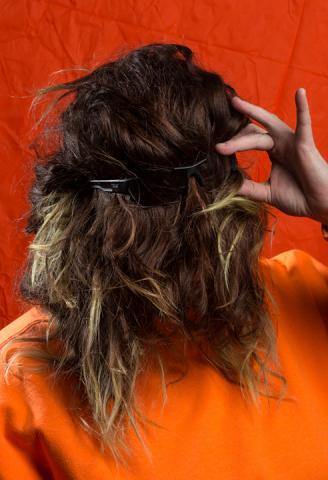Jane Trash - Portrait. 2019. Photo Credit: Stephen Harper.
BFA IN PRINT MAKING, 2004
Brandon GIESSMANN: When did you graduate from ACAD?
Jane TRASH: I graduated in 2004. I was 17 when I started. I was too young.
GIESSMANN: Oh yeah, I ended up switching majors after two years and I graduated high school at seventeen as well.
TRASH: That’s the thing. I don’t think artists are meant to do just one thing over and over and over again. And that’s what school is for, having the opportunity to explore.
GIESSMANN: What was your major?
TRASH: My major was Print, which I believe was Printmaking at the time.
GIESSMANN: Do you still work in print?
TRASH: Yes! I have owned a couple of print based commercial merchandise companies over the years. With a business partner or by myself. Now I focus on printing my own designs and the occasional commission.
My interests have definitely grown beyond printmaking but it is still a big part of what I do. The printing I do now is very similar to what I used to do in school but the inks are totally different so there was a bit of a learning curve, learning how to print fine art versus commercially. That’s not something that’s really covered in school but they can’t teach you everything. The basics were definitely there.
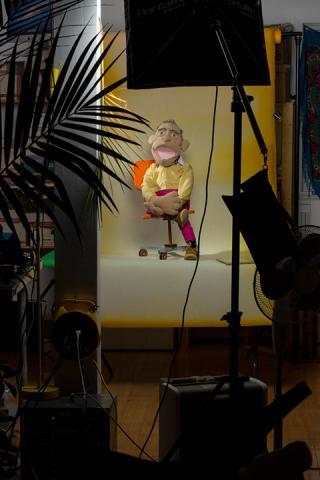
The Making of Richard Brown. 2019. Photo in the artist's studio. Photo Credit: Stephen Harper.
GIESSMANN: A lot of graduates use the ACAD degree as a creative stepping stone. So, what do you do? How has what you do evolved since graduation? How did your education at ACAD direct your career?
TRASH: My career has always been really self-directed, which I think obviously comes from my education at ACAD. I think graduating from Print and having a career in print, for me at least, was really easy in moving from one step to another but I think being my own boss and having the courage to go after what I wanted and just making it happen stemmed from my education. A lot of my teachers were very supportive, and if I didn’t know how to do something it wasn’t a case of, “You can’t do that,” it was like, “Okay, well go figure it out. How are you going to do that? How are you going to be able to afford that? How are you going to make something out of something else?” That has definitely opened a lot of doors for me in the sense that I’m not afraid to try anything. There’s nothing out there that I’m interested in that I would hold back from.
Obviously everyone has a different level of confidence but I feel going through the print program at ACAD really boosted mine. Not because I was a great student and got perfect marks but just because there is something fearless about being in an environment where anything is possible. My biggest strengths coming out of ACAD were definitely my ability to problem solve and being able to juggle a lot of different projects or tasks. I’m the type of artist who can’t do the same thing over and over again, I can’t do the same job over and over, so I’ve had anywhere between three to seven jobs for the last ten years. Which is crazy. A lot of that time management has helped me balance my home life, work life, social life, and all the different jobs and aspirations that I have.
Without being exposed to the artists, practices, and mediums that I was, I wouldn’t be doing what I’m doing now. I was very lucky to have some instructors who took an interest in what I was doing, and sort of molded me and guided me towards other research that I could look into or artist talks I could listen to, even studios I could be visiting. Having those people to look up to and listen to really helps you in your formative years and you take that with you for the rest of your career. Now I’m constantly asking questions and being inquisitive about the things I’m interested in, just to keep that snowball of learning and creating going.
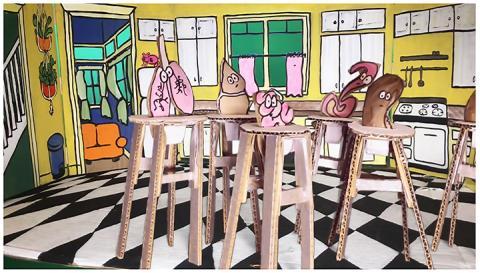
Operation. 2017. Video Still.
GIESSMANN: What would you like to be recognized for?
TRASH: I think everything that I’ve worked on, whether it’s my printing company, Tubby Dog, or the all-ages scene. I want to make a cultural difference in this city. I think it’s really important to have that culture in your own backyard as opposed to having to search it out. If I can do anything to impact that positively, that’s really what I care about most. Being a young artist in this city comes with its challenges, and being a young person who is part of or identifies with LGBTQ, racial issues, etc., can be even more of a struggle when navigating such closed-minded spaces. So I think anything I can do to change that and broaden everyone's horizons is awesome.
GIESSMANN: Given your experiences, what advice would you give a student when it comes to establishing a creative business?
TRASH: You don’t know as much as you think you do. Running around with your pens, pencils, and paper is great and obviously your studio practice is very important, but you are hugely lacking in the education you need to actually run a business. Or to create yourself as a business. Learn how to promote yourself realistically. The chances of you going out there to have your oil painting career pay for your car, home, and mother-in-a-retirement-home right away is very slim.
Ask the right questions, ask all the questions, and do all your homework. Take a business class if you’re actually serious about establishing a creative business. There’s a lot of competition out there, especially with the internet and everybody being an entrepreneur. My parents’ generation, nobody was an entrepreneur, you got a safe job and paid for your family. Now everyone is. Which is amazing and exciting, especially coming from the creative sector. It’s wonderful. But if you want a real good go at it, your Printmaking degree is not enough. You’re not done when you get that degree.
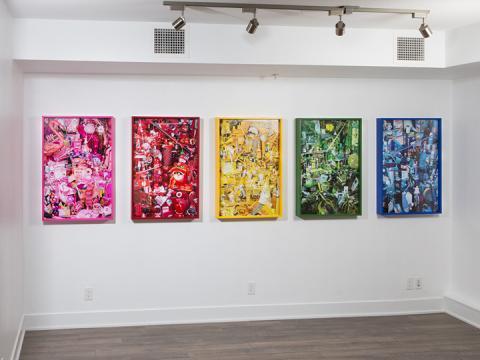
Everything Shucks (Exhibition view at Five AM, Calgary). 2018. In collaboration with Stephen Harper as Gap Tooth Sweatsuit. Photo credit: Stephen Harper.
GIESSMANN: One department I think that handles it really well is Jewellery + Metals. They’re very adamant about getting started and prepared for creating your own business. At Show + Sale they’re always there to represent themselves and interact with the public.
TRASH: Marketing yourself is huge and it’s something I still struggle with. I wish I had more direction, obviously that information is out there if you want to do the research, but I think it goes hand-in-hand with making art, being an artist, and being a business.
GIESSMANN: People need to see it. It needs to get out there.
TRASH: Exactly. No one wants to be Van Gogh. Yeah, his work is great but nobody gave a $hi# until he was dead.
GIESSMANN: That’s one of the good things about Show + Sale, they have workshops where these topics are briefly touched on but there’s this stigma about marketing yourself.
TRASH: But if you want to eat, stay alive, and not work an oil job then you have to. That’s the thing with me. All the jobs I’ve chosen I’ve loved. They’re great but I’m not making a lot of money. I’m comfortable, I can pay the bills, I don’t have to worry too much but that’s a sacrifice you have to make. If you want to be in the arts, and you don’t want to be in a corporate industry, especially in Calgary, that’s a huge hit to your cheque book and you need to be able to make the money somewhere. You need to take it seriously.
GIESSMANN: What insights did your four (or one, two, three, five, six) years at ACAD give you when looking at things?
TRASH: I think the biggest thing is problem solving. Being able to think on my feet in high stress situations. That definitely came from creating projects that were too big and then having to finish them in a certain amount of time. It definitely gave me the confidence to go after what I want, no matter how stressful or daunting and then totally being okay with failing. I think failure has got such a negative connotation to it but I think it’s one of the most helpful things for you. When I look back at my ACAD career I was happy or proud of maybe ten percent of the work I did while I was there for five years, but all those failures or mistakes now twelve years later, have given me so much to learn from and build off of. That constant, “Is this going to work? I don’t know, but keep trying,” has really propelled the rest of my career and all the decisions that I have made since then. Not being afraid to fall down.
GIESSMANN: Yeah, you definitely get a lot more feedback for a failure than you do a success.
TRASH: Nobody likes failing but what you learn from that is invaluable.
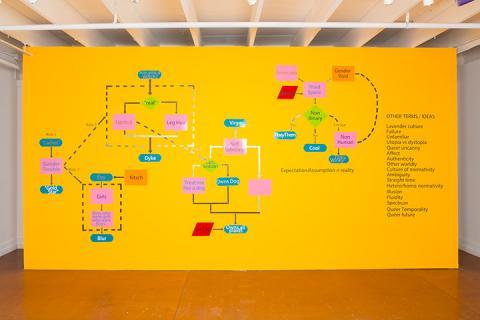
Show Up for the Messiness of how you Feel so you can Better Create What you Need (installation view at TRUCK Contemporary Art in Calgary). 2018. Collaboration with Adrienne Crossman; curated by Dana Buzzee for Femme Wave Festival. Photo credit: Stephen Harper.
GIESSMANN: After graduation, what obstacles did you encounter and how did you overcome them?
TRASH: I think the biggest thing is when you come out of school you don’t have that support system anymore. You have your community and your peers but you don’t have an institution to fall back on. To guide you towards what to do next. It was sort of daunting when that September came around the next year and you’re not going back to school. I think you get through it like anybody does, you rely on your abilities and your self-determination to be creative, to do things, and to be different. So I think the biggest obstacle you face is, “What’s next?” Everybody finds their own answer to that. I can’t give advice to everybody on how to solve that. It’s hard not to sound like a Hallmark card but believe in yourself. You can do it! I’m a very chaotic person. I don’t live in any sort of harmony, don’t have any sort of schedule or routine, which is a part of being your own boss but it’s exciting. I think to take that lost feeling and fear out of it and replace it with excitement is great. It doesn’t bother me now that I don’t have this overall plan for the future because I know that I’m going to come out on top. I think it’s hard to explain how you overcome that but I think you just have to have faith in yourself and your abilities. Don’t say no. Just do it!
GIESSMANN: What do you feel is the role of ACAD and our alumni in shaping our cultural and economic prosperity?
TRASH: I think it’s hard to make art in a vacuum. There’s always an audience. I feel if you’re doing that you’re instantly participating in creating culture. If you’re lucky enough to have that become some sort of economic prosperity for yourself that’s wonderful.
GIESSMANN: Where does art fit into your future?
TRASH: I have to make something every single day. Art always has to be a part of that. It’s something I’ve been interested in since the youngest age. I can’t imagine it’s ever going to go away. For me it is about being creative more than its about making art. Whether I spend an hour and a half making a birthday card for someone or spend six months making a short film, there’s always something and I can’t just make one thing at a time. These projects are constantly overlapping and evolving, giving me ideas for the next project. I don’t know how people aren’t like that, I don’t know how people aren’t making stuff all the time. But I suppose if everyone was me that would be really boring.
